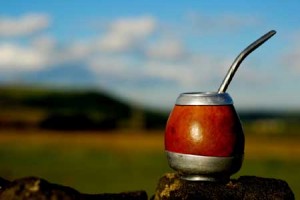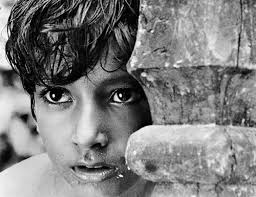 I’ve been thinking about faraway places – and trying to experience them via hot drinks. At the grocery store the other day I saw a package of yerba mate, a deliciously earthy beverage from South America I used to drink quite often, and just had to pick it up. Traditionally, a porous gourd is nearly filled with the ground-up leaves (and sometimes stems) of the Yerba Mate plant, hot water is poured over it, and a bombilla (a metal straw with a strainer at the bottom) is used to suck out the liquid. Even if I’ve never been to South America, it reminds me of the friends I’ve made from that part of the world, and reminds me that I intend to get there sometime.
I’ve been thinking about faraway places – and trying to experience them via hot drinks. At the grocery store the other day I saw a package of yerba mate, a deliciously earthy beverage from South America I used to drink quite often, and just had to pick it up. Traditionally, a porous gourd is nearly filled with the ground-up leaves (and sometimes stems) of the Yerba Mate plant, hot water is poured over it, and a bombilla (a metal straw with a strainer at the bottom) is used to suck out the liquid. Even if I’ve never been to South America, it reminds me of the friends I’ve made from that part of the world, and reminds me that I intend to get there sometime.
Last month, I was feeling the need for high mountain oolong tea, so I got out my Yixing teapot. This teapot is made of a Chinese clay that absorbs the flavors of the tea, steeping after steeping. My teapot is brown with a delicately sculpted red leaf emerging around the handle and coming to rest on the side of the pot. If you rub your finger over a wet area of the clay, it feels as smooth as newborn skin.
 I think this most recent strand of thought about faraway things started with the passing of Ravi Shankar last December. I was introduced to the Indian films that make up the Apu Trilogy (which Ravi Shankar composed and performed the music for) when I was spending summers at Marlboro. These were films made in the 1950s, starring untrained actors. They are spare by modern, fast-paced, American blockbuster taste, and made with the equivalent of three thousand dollars. If there were ever an argument for the “less is more” crowd, this is it. The stories are poignant, powerful, and so very human – no special effects needed.
I think this most recent strand of thought about faraway things started with the passing of Ravi Shankar last December. I was introduced to the Indian films that make up the Apu Trilogy (which Ravi Shankar composed and performed the music for) when I was spending summers at Marlboro. These were films made in the 1950s, starring untrained actors. They are spare by modern, fast-paced, American blockbuster taste, and made with the equivalent of three thousand dollars. If there were ever an argument for the “less is more” crowd, this is it. The stories are poignant, powerful, and so very human – no special effects needed.
Another story that captivated me was the one told Pearl Buck in The Good Earth. I had heard her name and knew of the book for years, but had no idea what was in store for me when I found it on our condo’s bookshelf during our travels this summer. How could I feel such camaraderie with Chinese peasants living the early 20th century?
It is easy to become closed off and mired in day-to-day concerns. What a relief it is to hear a sound that the ear is not accustomed to, the drone and riffs of a sitar beginning to play, and be transported to a land and culture that is not one’s own. Or to sink into a book and unexpectedly feel a kinship with those whose lives are completely other.
I will never forget the day I sat in a hotel room in Israel, Jerusalem on the horizon, a Muslim call to prayer from a nearby Palestinian town wafting through the window. The realization that I lived my life under the same stars was a thunderbolt. The world became both smaller and larger. More known and more unknown. Complicated. Somewhat frightening. Beautiful.
As good as it is to live deeply where we are, there is something to be said for giving our brains a cold-water dip into something completely other, in whatever way is available to us – to let the difference fill us up and shock us.
I often suggest to my students that they spend some time listening to non-horn music. In fact, to listen to great music and great musicians no matter the instrument and no matter the genre. Only when I had spent some time listening to Balinese gamelan did John Cage’s prepared piano pieces come alive for me. Neither of these things had direct influence on the way I played the Mozart concerti, but they did open my ears – the aural equivalent of a flight across the world.
My husband sometimes talks about the experience of seeing a work of art from afar, then very closely, observing each individual brushstroke, then taking a long view again. I feel like this is a beautiful way of going about nearly everything in life. Looking at it up close, living it deeply, and then finding ways to look at it from above the clouds or from the other side of the world, even if, sometimes, we only have a cup of tea to take us there.

One Response to Faraway Places